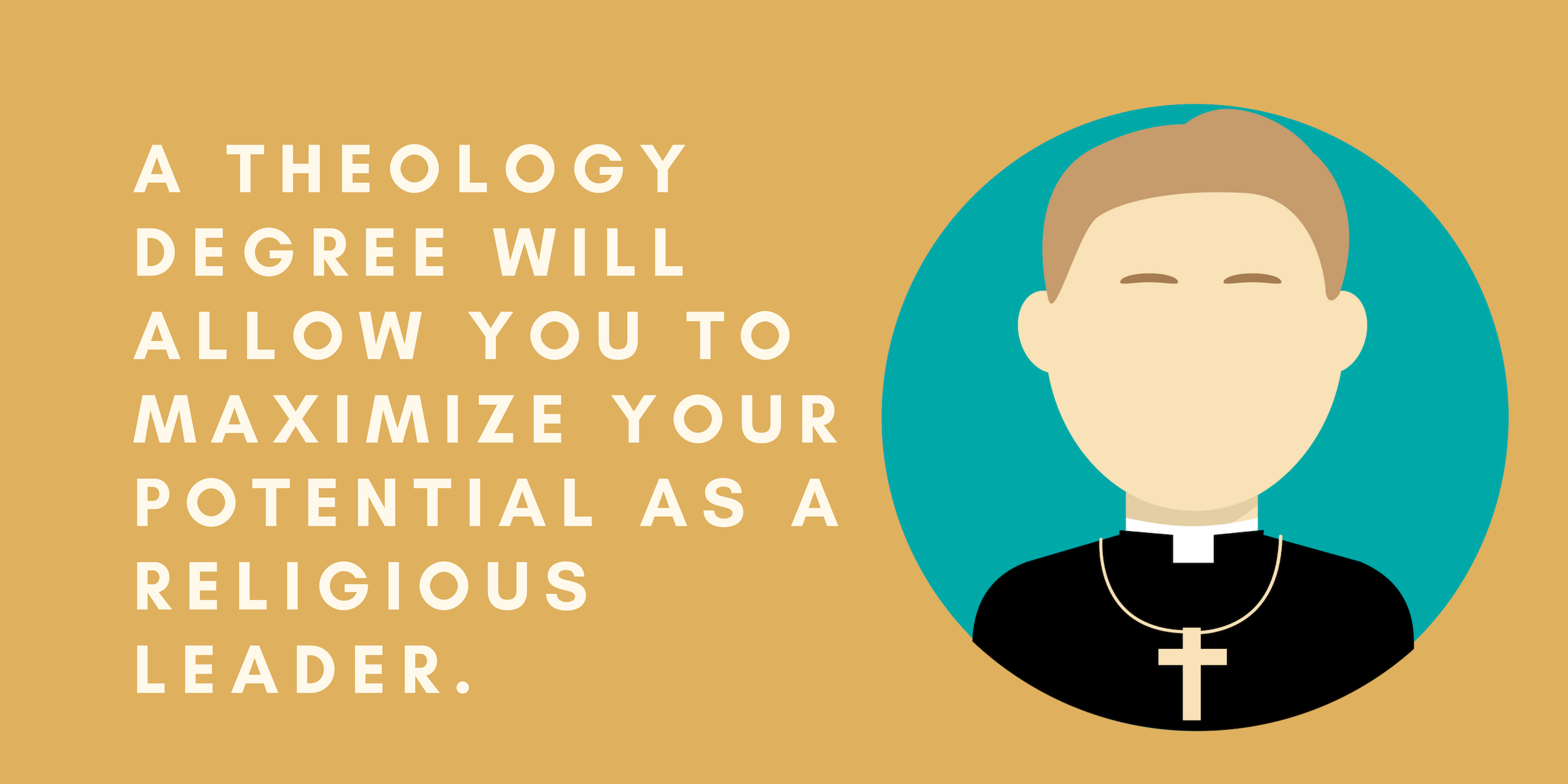Just as a candle cannot burn without fire, men cannot live without a spiritual life. – Buddha
![]()
Theology and religious degrees are versatile, flexible, and fascinating programs. Unlike a degree in say, physics, it’s far more likely to find a religious or theology degree that you can customize. While there are similar things you’ll study across religious and theology degrees, they are far more uniquely constructed to individual interests and pursuits.
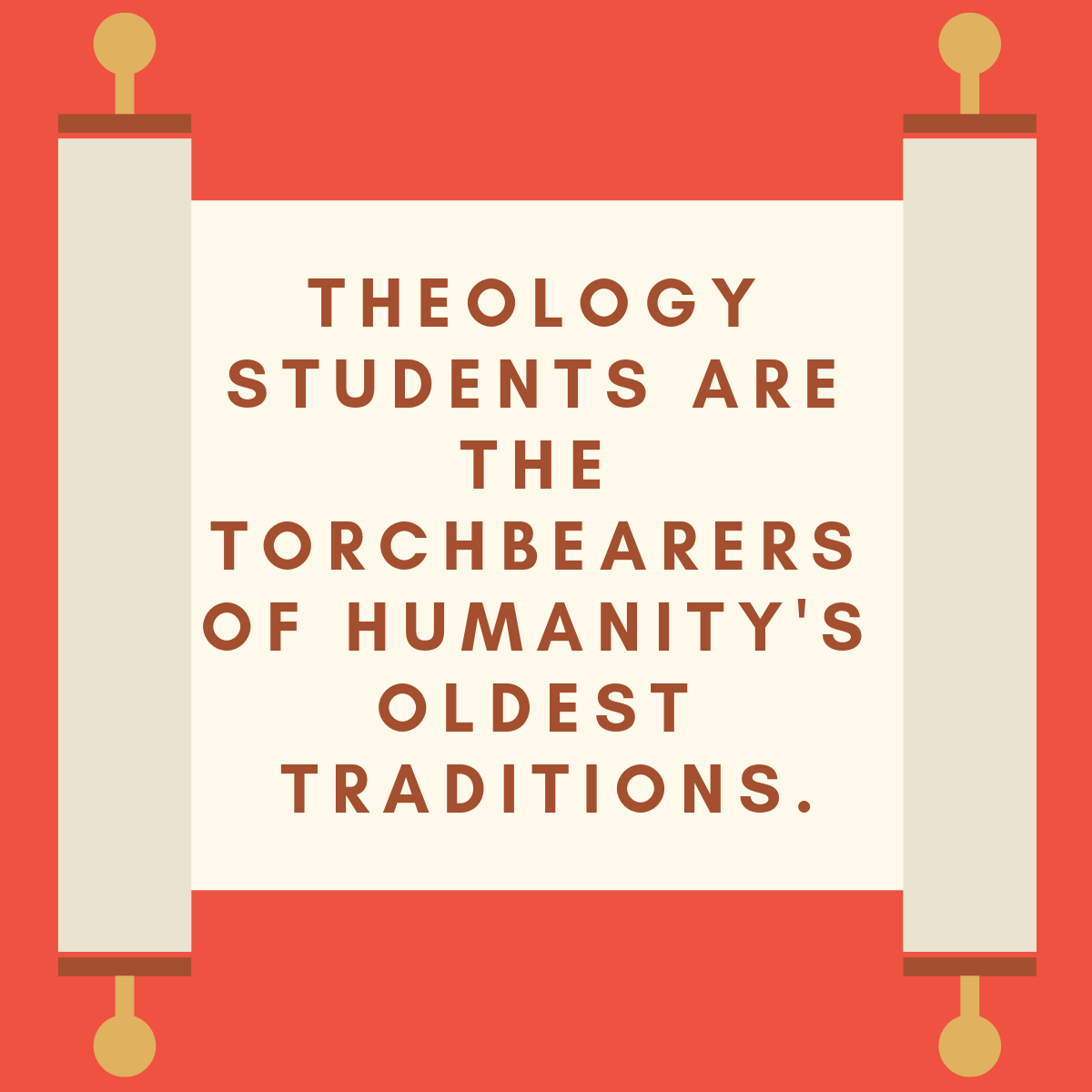
If you’re passionately religious these can be great degrees for you, as they’ll strengthen your relationship with specific religions, and examine the relationships between them. They can also prepare you for roles working within specific faiths. However, even if you’re not religious, studying religion is useful and compelling, and can lead to positions in academia, writing, and much more.
Religion and Theology degrees look at different faiths, and how humans experience and express their spirituality through organized and individual worship, communion, beliefs, behavior and more. In these degree programs, you’ll study history, anthropology, philosophy, religious texts, and the development of different religions around the world. Some programs focus on specific beliefs, and many people take religious and theology degrees that concentrate on religions they don’t belong to.
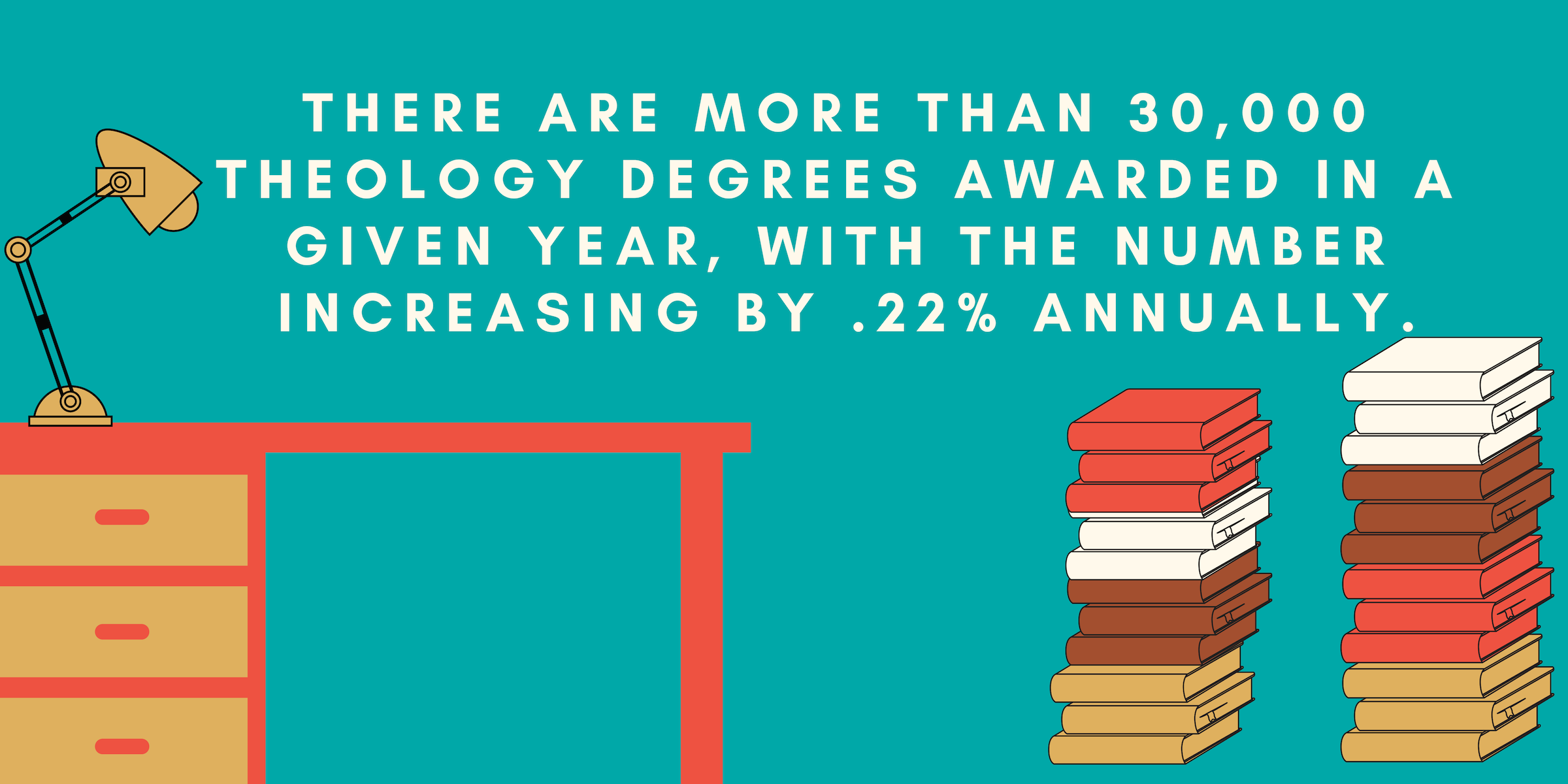
In this guide, we’ll look at the different levels and specializations in religious and theology degrees, trends in the field, point you in the direction of top schools that offer undergraduate and graduate degrees, and give you other useful information to help your search. When reading through it, please consider the following:
- Where are you so far in your career and education? How has your previous experience prepared you to study and work in religious degrees and jobs?
- Depending on your religious interest you might know exactly what kind of degree you want and what you’d use it for. If not, consider a more well-rounded theology degree that can help you discover where you’d fit in the field.
- What degree level in religion and theology is right for you considering your educational background?
- What are your career goals over the next five to ten years? How would a religion or theology degree help you reach them?
- How much can you pay in tuition and other associated costs for a degree in religion or theology, and how much would you need to borrow to pay for one?
- There are many different costs associated with earning your degree depending on where you study if you live on-campus, and whether you take classes online or in-person.
- Do you need to work full or part-time while you attend school?
- You should always prioritize public loans over private, high-interest loans and choose public ones. If you can, choose a program you can afford or one that gives you grants/scholarships.
- How much time can you spend earning your religious degree daily, weekly, and in total before you graduate?
- What’s the best delivery format for you in a theology degree program? Do you want to go to school full-time, part-time, in-person, or online?
- What part of religion and theology would you like to study and practice? Some programs concentrate on specific religions, ones that prepare you to serve in a ministry, and ones that are geared towards academic work, among other options.
- Where would you like to live and work during and after earning your theology degree?
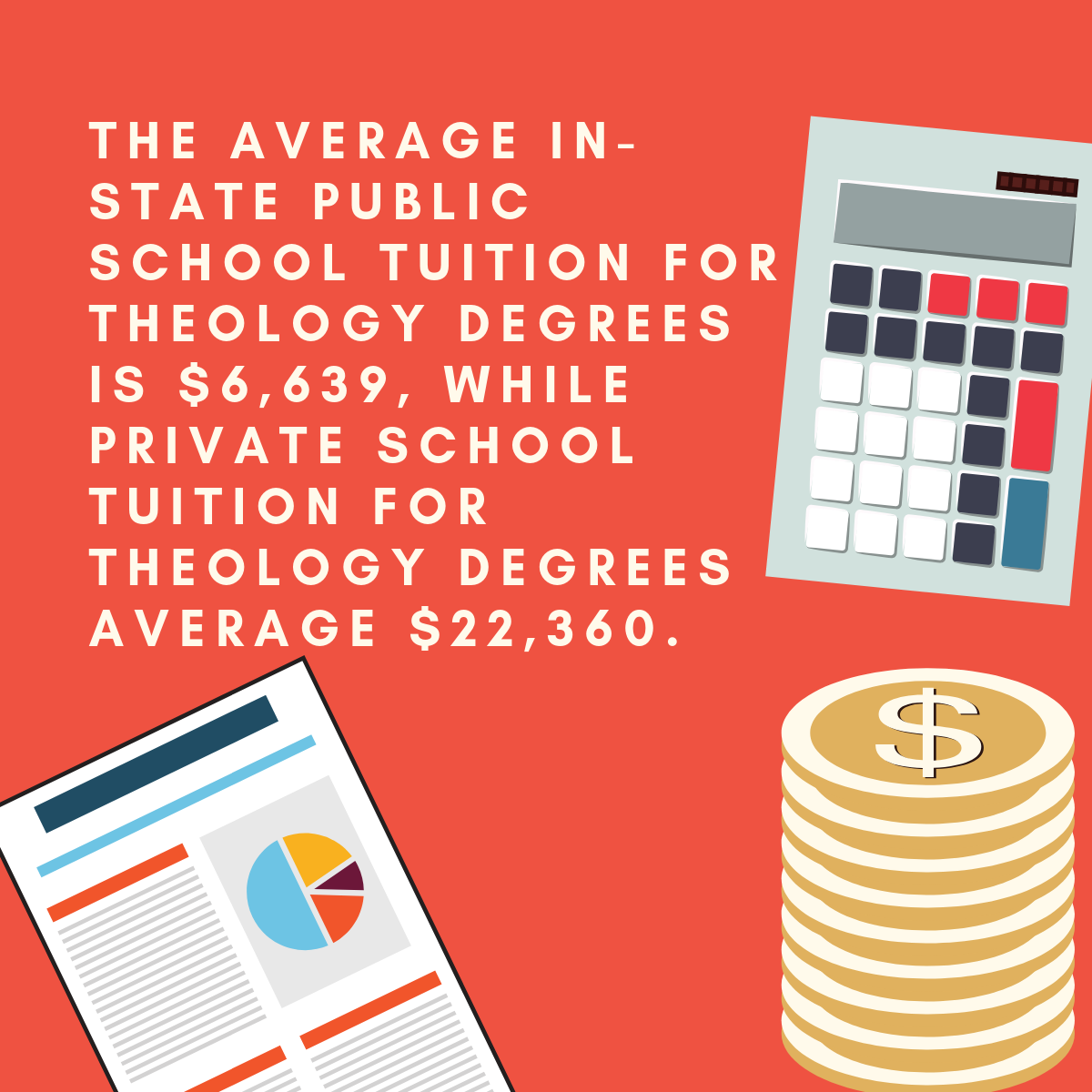
Religion and Theology Degree Levels
Religion and Theology degrees are offered at all levels of academia, and career qualifications vary depending on the level of degree and subject of specialization. If you are an undergraduate student and are planning on going on to earn a graduate degree in theology, it is recommended that you earn a bachelor’s degree with a major in theology, although you can be accepted to graduate programs with any undergraduate major. Let’s have a look at some of the degrees offered at various levels of academia.
Associate’s Degrees in Theology
Associate’s degrees in theology are usually two-year degrees that augment your learning as a minister or provide an introductory program in a collegiate atmosphere. Usually, students who earn an Associate’s degree in theology go on to complete their bachelor’s degree in a related field. Associate’s degrees require 60 credit hours, roughly half of which will be concentrated in your major. The major for your bachelor’s degree is usually influenced by the type of Associate’s degree you receive, so you should be familiar with the different types of Theology Associate’s degrees, which include:
- Associate’s of Arts (AA) in Religion: An AA degree in religion is a general theology degree in which you will study the world’s major religions, as well as some more obscure and historical religions. This AA degree is highly versatile and will give students a strong academic base to build in a variety of directions, both in theology and other areas of the humanities and sciences. Examples of courses in this type of program include Methodical Study of Scripture, Global Studies, and Theological Interpretation of the Bible.
- Associate’s of Arts in Biblical Studies: An AA degree in Biblical studies will provide reading-intensive courses that are designed to increase your knowledge and understanding of the Bible. This AA degree is geared towards providing an academic basis for students who want to go on to study apologetics, church leadership, or Christian ethics. Examples of courses in this type of program include Biblical Interpretation, History of Christianity, and Introduction to Systematic Theology.
- Associate’s of Arts in Christian Ministry: An AA degree in Christian ministry will provide a curriculum that is meant to improve the skills and knowledge of priests and ministers of the Christian faith. This degree will provide a strong academic basis for students who want to go on to lead their congregation or continue their studies in fields such as church leadership, religious education, or Christian ethics. Examples of courses in this type of program include Analysis of Romans, Apologetics and Evangelism, and Doctrine of the Bible.
- Associate’s of Arts in Divinity: An AA degree in divinity is designed to help students grow towards personal maturity and ministry competence. They are similar to Christian ministry degrees, with the main difference being that they provide knowledge of other religions as well. Examples of courses in this type of program include Pastoral Ministries, Spiritual Formation, and Ministerial Counseling.
Bachelor’s Degrees in Theology
Bachelor’s degrees in theology are four-year degrees that provide an overview of religious studies combined with general overview classes of other subjects in the humanities and sciences. Bachelor degrees are four-year degrees and usually require the completion of 120 credit hours, about 60 of which will be based in upper-level courses in the area of theology in which you are majoring. There are several types of bachelor degrees in the field, and they are further broken down by the particular academic specialization that is chosen by the student. Some of the common bachelor’s degrees in theology include:
- Bachelor of Divinity (BDiv): A BDiv degree is designed to prepare students for careers in various clerical positions. Programs will help students build their knowledge of the Word of God, as well as equip them with tools to communicate clearly and effectively. Examples of courses in this type of program include Old/New Testament Survey, Hermeneutics, and Church History.
- Bachelor of Religious Education (BRE): A BRE degree is designed to train future teachers of religion and theology, both in the classroom and in places of worship. The curriculum will build students knowledge of different religions, and give them the ability to break down complex religious doctrines to communicate them clearly to congregations or their students. Examples of courses in this type of program include Jews, Christians, and Muslims, Religion of Ancient Israel, and Native American Religions.
- Bachelor of Sacred Theology (STB): An STB degree is an ecclesiastical degree that gives students an educational background in basic theology, and prepares them for further study of religious texts or religious research. Examples of courses in this type of program include Principles of Christian Moral Life, Creation and the Human Person, and Ecclesiology.
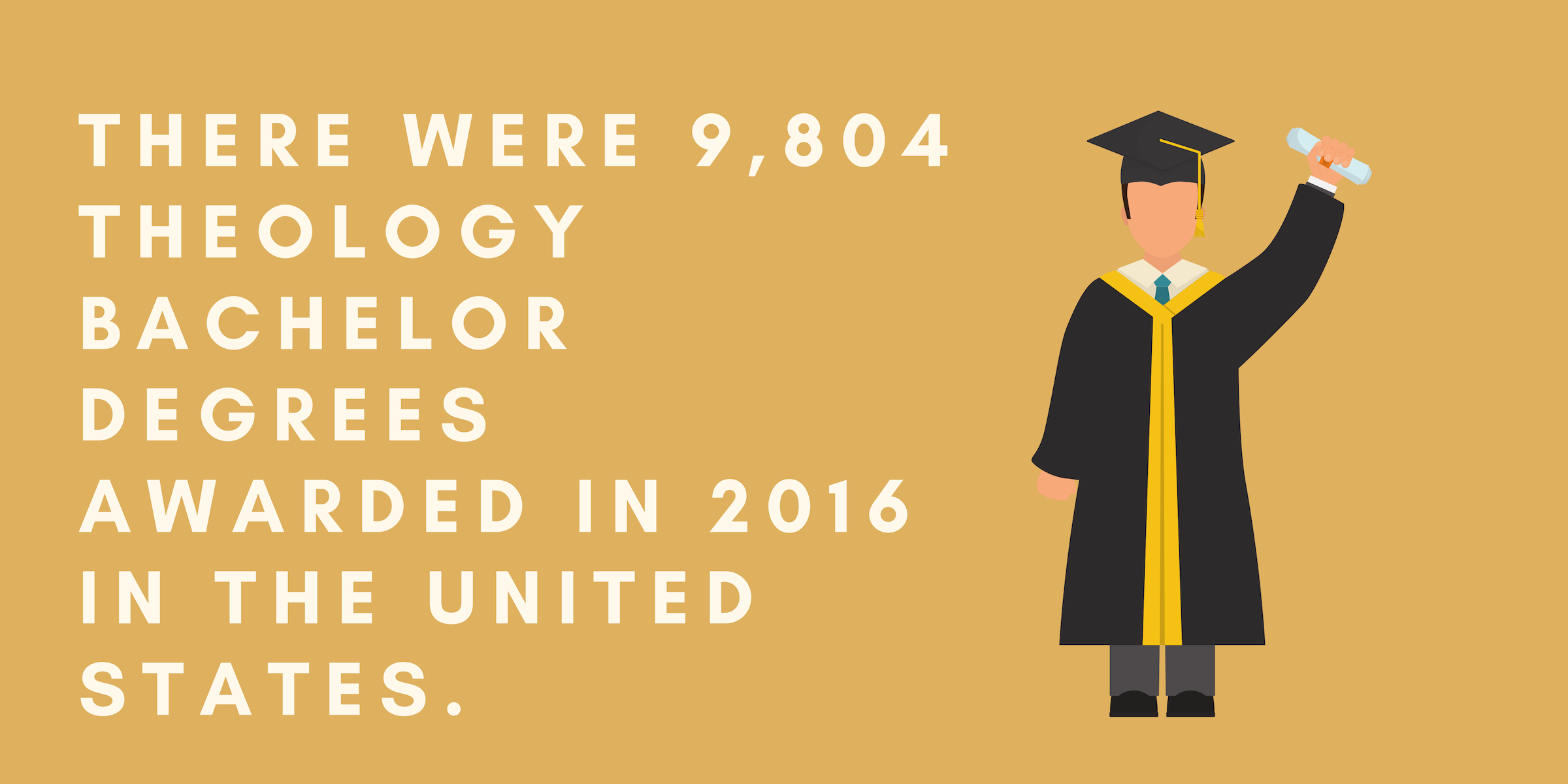
Master’s Degrees in Theology
Master’s degrees are graduate-level degrees that require students to have already earned a bachelor’s degree, preferably in an academic area that is related to their field. Master’s degrees in theology generally require the completion of at least 30 credits, as well as the completion of an internship, capstone project or thesis paper. Some types of Master’s degrees in theology include:
- Master of Divinity (MDiv): MDiv degrees are focused on providing upper-level education for eventual ministers, usually in the realm of Christian faith. Curriculums revolve around courses that are designed to build theological knowledge in a specific area of specialization while being able to communicate these ideas in ways that are clear and concise. Examples of courses in this type of program include Christian Traditions, Christianity Engaging Modernity, and Introduction to the Hebrew Bible.
- Master of Religion (MRel): MRel degrees are designed to give students an in-depth academic basis in the specialization of their choice. MRel degrees allow students to study any religious tradition, including the history of obscure religions that are unknown to the general populace. Examples of courses in this type of program include Religion and Society, Religion and Sexual Ethics, and Heaven, Hell, and Other Afterlives.
- Master of Theological Studies (MTS): MTS degrees are designed to give students a variety of lenses to analyze various theological texts and traditions, providing them with an upper-level academic background to work in a variety of careers depending on their specialization. Examples of courses in this type of program include Exegetical Theology and Hermeneutics, Historical Theology, and Apologetics.
Doctoral Degrees in Theology
Doctoral degrees in theology are terminal degrees that represent the highest qualifications in theological academia. The difference between a Ph.D. in theology versus a doctorate in theology is that PhDs are designed for academic research, while doctoral degrees are for the specific professional application. Doctoral degrees generally require the completion of 90 to 120 credit hours and the defense of a thesis dissertation. Some types of doctoral degrees in theology include:
- Doctor of Divinity (DD): A DD degree will give students an academic background that allows them to become effective leaders of parishes and congregations. As a professional degree, most of the curriculum will be geared towards practical approaches to leading religious organizations. The types of courses that you take in a DD degree program will vary depending on your specialization, but all of them will revolve around theological concepts.
- Doctor of Biblical Studies (DBS): DBS degrees are designed to train renowned religious scholars who have a thorough knowledge of the Bible and other Christian texts. Students will study the Old and New Testament at depths that will go far beyond common reading. Examples of courses in this type of program include Apologetics, Scripture Exegesis, and Latin.
- Doctor of Philosophy in Theology (Ph.D.): A Ph.D. in Theology program is designed to provide an academic approach to theological issues. These programs are not limited to Christianity and can encompass a wide range of religions and religious texts. The types of courses you will take in this type of program are largely dependent on your specialization but will prepare students more for religious research, collegiate professorship, and other academic careers, as opposed to careers in the church.
For more information about the specific curriculum and requirements, be sure to check out a school’s website and request more information. Different schools offer particular specializations for their degrees, which will help determine what career options you will be qualified for after graduation.
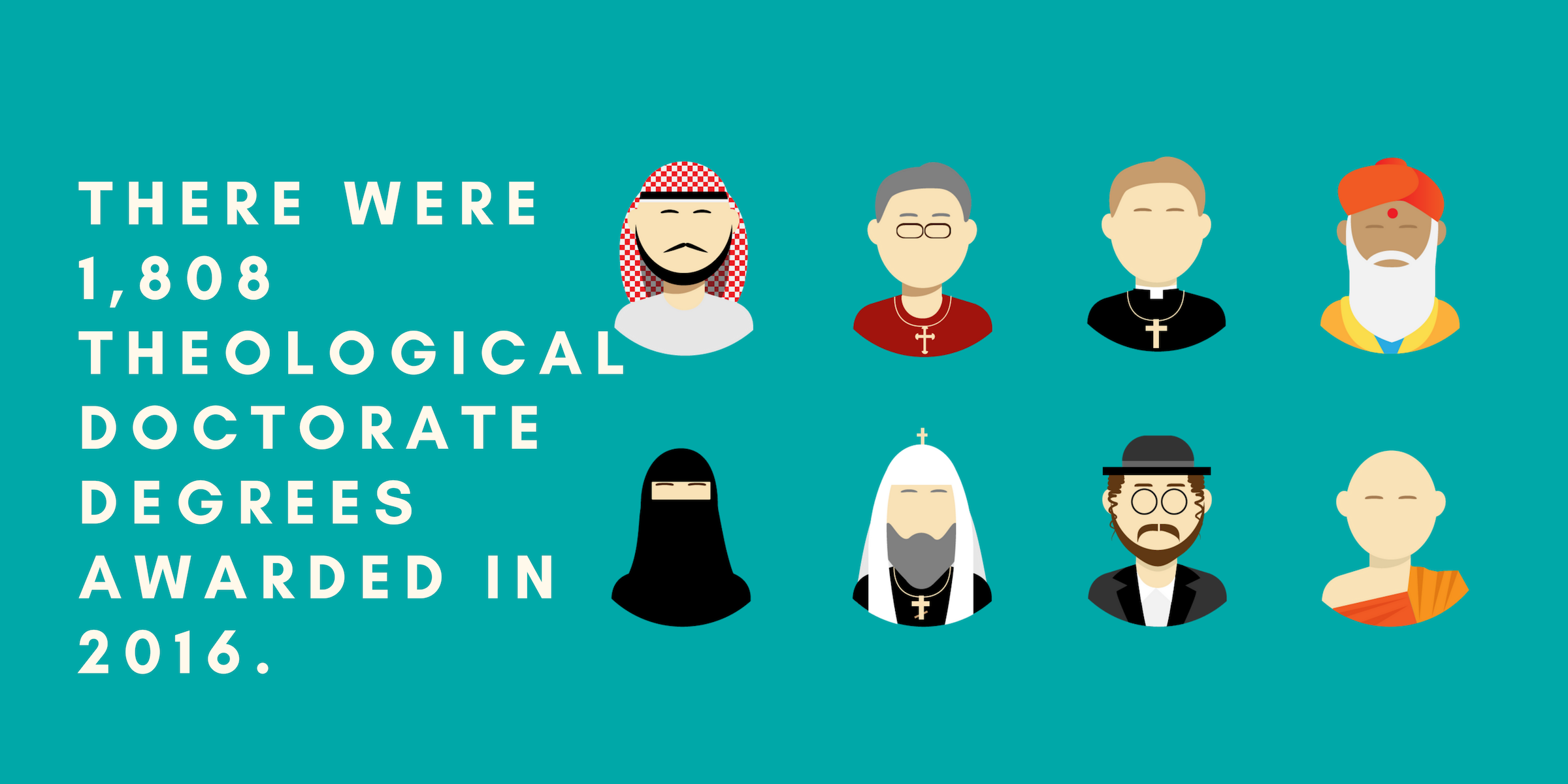
Religion and Theology Specializations
There are a variety of specializations that are available within the fields of Religion and Theology. The specialization that you choose will provide a structure for your curriculum and allow you to differentiate yourself from other students. These specializations can be offered at all degree levels, though the higher your degree level, the more concentrated your curriculum will be in that particular subject. If you have a good idea of what you want to do for your career, then you can search for schools that offer a specialization in your area of interest. If you are not sure, then you should find a school with options that you might consider, and then meet with your academic advisor to determine the right specialization for you. Some of the most common specializations in the field of Religion and Theology include:
- Ministry or Church Leadership: A degree with a specialization in church leadership will focus on skills that will allow you to be an effective congregational leader. Some skills that you can build in this specialization include church revitalization, children and family ministries, media ministry, and pastoral leadership.
- Religious Education: A specialization in religious education will train students to become theological professors or Sunday school teachers. The curriculum will be designed to help students convey complex religious topics in ways that are accessible and entertaining.
- Apologetics: Apologetics is the study of contentious aspects of religious texts, questioning translations and interpretations as they have evolved over the centuries. This specialization is meant for people who want to read scripture rigorously.
- Historical or Liturgical Theology: Historical and liturgical theology is usually an academic specialization where students study the history of religion by doing research. This specialization is often interdisciplinary, and therefore is one of the more versatile theology specializations.
- Christian Ethics: A specialization in Christian ethics will give students an understanding of the ideas of morality as seen through the Christian religion. This specialization will offer courses that discuss Christian ideas of prudence, justice, and temperance, among others.
- Fundamental and Systematic Theology: A specialization in fundamental and systematic theology will combine the historical study of religious texts and events with contemporary ethics and cultural understanding to reconcile ancient traditions and the modern world. This specialization is meant for pragmatic thinkers who believe that religion has to adapt to the current moment to reach the maximum amount of people.
If you are curious as to what specific courses you will take in a given specialization, you can find syllabi on school websites. If you still have questions about what one of these specializations will entail, be sure to request more information.
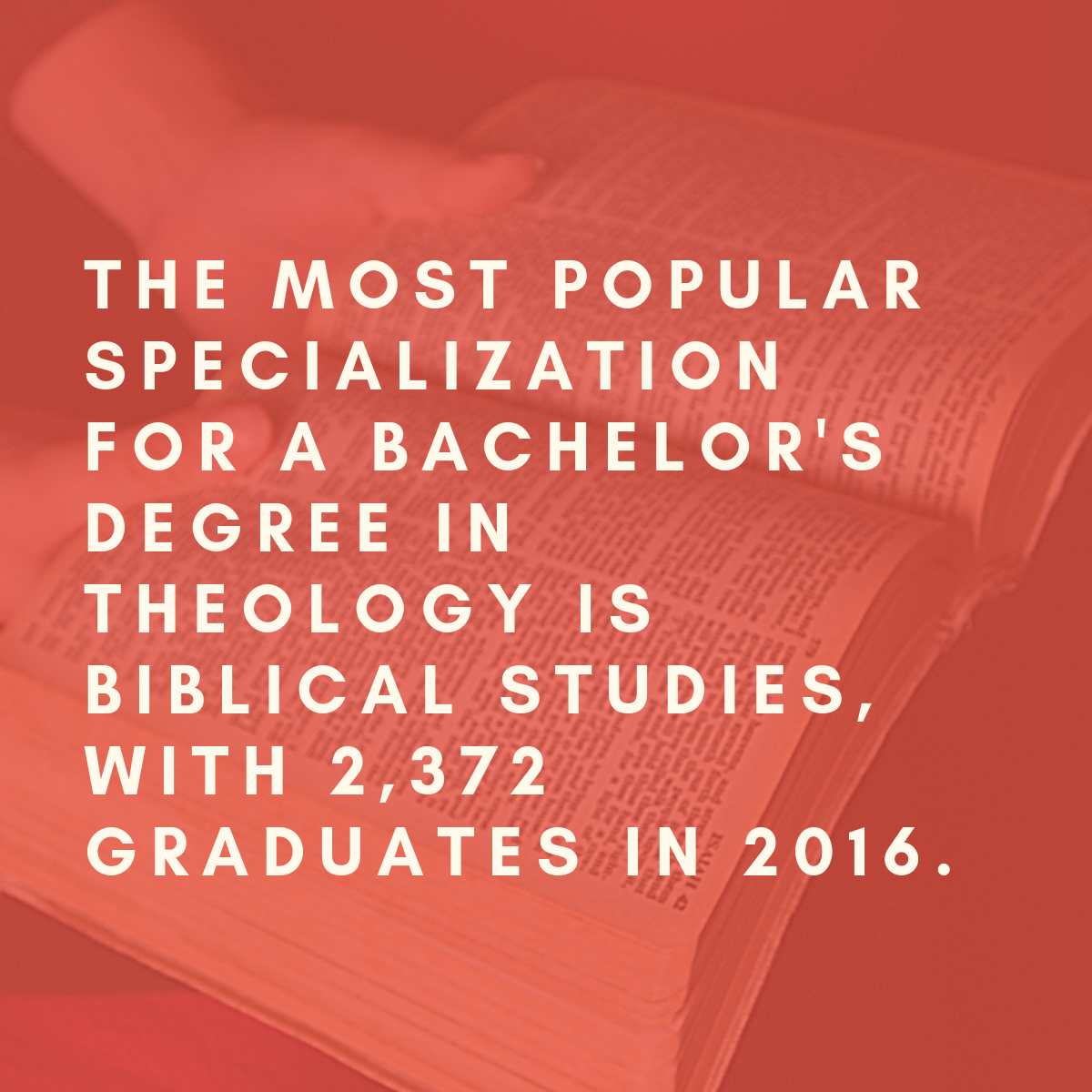
What Can We Do to Help You Find a Great School?
With a large number of schools offering religion and theology degrees, the options can seem overwhelming. Fortunately, you’ve already taken a step in the right direction by checking out our resources here at Degree Query. We have compiled rankings, frequently asked questions, and other resources to help you start your school search.
Rankings
Some of our rankings that can help get you started with searching for schools include:
- The Top 50 Degrees for Changing the World
- The 50 Highest Paying Bachelor’s Degrees
- The 100 Most Affordable Online Colleges and Degrees of 2018
- The 50 Best Online Degrees
- The 50 Fastest Online Bachelor’s Degree Programs
If any of the schools on our list might be the right fit for you, be sure to follow the links to their school website and request more information about their specific programs.
Frequently Asked Questions
Some of the degree queries that we have answers for on our site include:
- Which Degree is Better: AA or AS?
- What are the best degrees to get?
- What Degree Do You Need to be a Teacher?
- What Degree Do You Need to be a Social Worker?
- How Much Does it Cost to Study Abroad?
Other Resources
- Special Report on the Credibility of Online Degrees
- The 50 Most Educated Places in America
- Career Comparing Spreadsheet
Be sure to check DegreeQuery.com regularly for new content and information regarding religion and theology degrees.
Careers in Religion and Theology
The career options that are available for graduates with a degree in religion and theology can vary greatly depending on their level of degree and their chosen major or specialization in their field. While undergraduate level degrees have a lot of versatility for career paths, graduate degrees in religion and theology are predominantly meant for students who will go on to work in a religious or academic institution. While there are an endless amount of possibilities for employment after earning your theology degree, some of the most common careers for religion and theology graduates are:
- Clergy: Clergy leaders conduct religious worship in various denominations, and provide mentorship for their local communities. Clergy workers make an average salary of $50,800, and there are currently 49,850 positions employed in the United States.
- Religion Teacher/Professor: Religion teachers provide educational services at schools and religious institutions, communicating religious concepts and engaging students and congregational members. Postsecondary teachers make an average salary of $76,000, and there are currently 1,314,400 positions employed in the United States.
- Community Organizer: Community organizers create support systems for their communities by designing and implementing social service programs, activities, and entertainment. They earn an average salary of $64,100, and there are currently 147,300 positions employed in the United States.
- Social Worker: Social workers provide services that help people overcome challenges that arise in their life. Social workers earn an average annual salary of $47,980, and there are currently 682,100 positions employed in the United States.
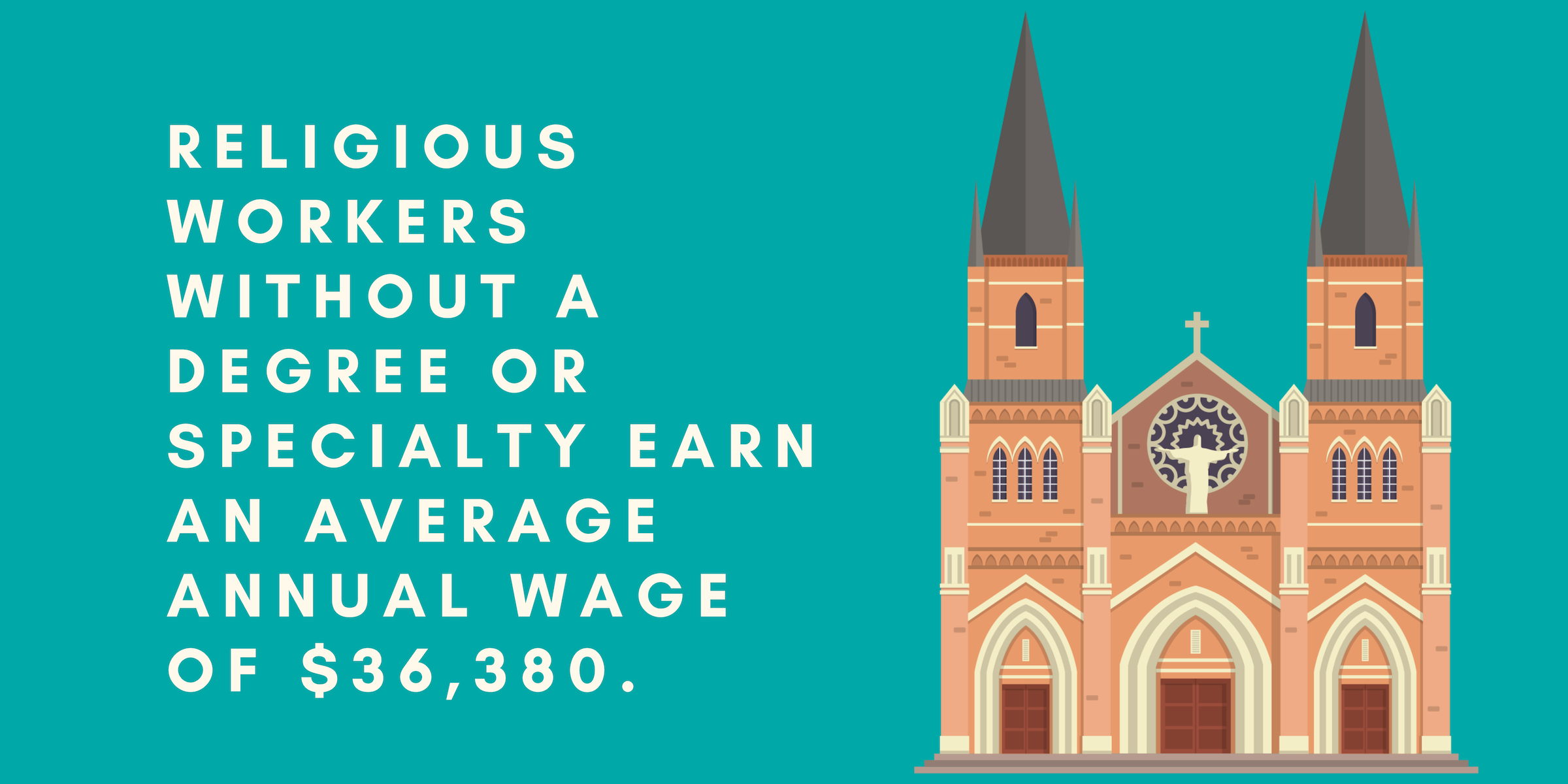
Religion and Theology Degrees in Conclusion
Degrees in religion and theology are great for students who will go on to become preachers, ministers, or priests, but they are also versatile degrees that can provide the academic basis for many other professions including psychology, public health, and sociology. With the number of great degree programs that are available today, you will be able to find a program that meets your academic expectations and help you on your path towards your desired career. We hope that the resources we have compiled here at DegreeQuery are helpful, and we wish you good luck!
